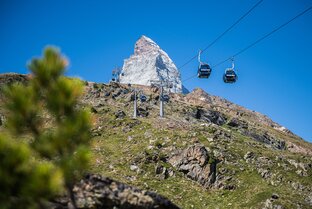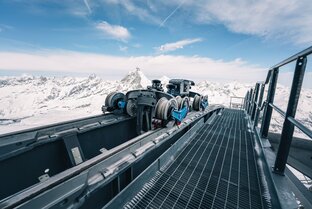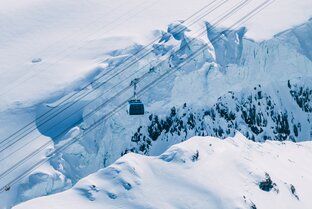

23.09.2022
A successful financial year with record figures
The key figures speak for themselves: operating income of CHF 82.5 million, EBITDA at CHF 45.6 million and cash flow of CHF 42.5 million are all absolute record highs. Important indicators for 2021/2022 once again reached record levels, with EBITDA at 55.3% of operating income and cash flow at 51.5%, clearly outperforming the cable car and mountain railway industry benchmarks. Despite the excellent figures, the Board of Directors is proposing to shareholders that no dividend be paid. Even after this very good financial year, the key balance sheet figures are still not at the levels achieved prior to the COVID-19 pandemic, and priority should be given to redressing this situation.
The key figures speak for themselves: operating income of CHF 82.5 million, EBITDA at CHF 45.6 million and cash flow of CHF 42.5 million are all absolute record highs. Important indicators for 2021/2022 once again reached record levels, with EBITDA at 55.3% of operating income and cash flow at 51.5%, clearly outperforming the cable car and mountain railway industry benchmarks. Despite the excellent figures, the Board of Directors is proposing to shareholders that no dividend be paid. Even after this very good financial year, the key balance sheet figures are still not at the levels achieved prior to the COVID-19 pandemic, and priority should be given to redressing this situation.
Shareholders were invited to attend the Ordinary General Meeting of Zermatt Bergbahnen AG, held for the second time at the Matterhorn Test Centre on Trockener Steg. The Board of Directors under the chairmanship of Franz Julen and the Executive Board led by CEO Markus Hasler were able to report on an extremely successful financial year, with record figures. Visitor numbers for the summer of 2021 were around the same as the previous year, albeit still down by up to 18% compared with the summer of 2019, the last “normal” summer before the COVID-19 pandemic. As a result, sales were lower than in 2019, although the figure was slightly higher than for the 2020 business year. Analysis of the visitor mix reveals that international visitor numbers have not yet fully recovered, and the consequent losses were not offset by the increase in domestic visitors. A continuation of the trend in the demand for one-way tickets to the departure points for hiking tours was noted. This was once again significantly higher than the demand for excursion tickets and return trips to the various peaks. The summer skiing area was the only business segment to show further growth year on year. Due to the travel restrictions imposed in the previous summer, the demand for training opportunities on the glacier was extremely high and a waiting list had to be established for piste reservations. Sales in this area showed an increase of 7.5% year on year.
Under the continuing influence of the COVID-19 pandemic, the general trend in the autumn of 2021 was rather unfavourable, although in contrast to the other Alpine countries, only minimal restrictions were enforced in Switzerland: masks still had to be worn in enclosed cabins and the rules on vaccinations and immunity remained applicable in the hospitality sector. The tougher regulations in Italy meant that there was an almost complete absence of visitors from abroad on the slopes at Cervinia/Valtournenche. Thanks to the extensive use of snow-making technology it was possible to offer outstanding piste conditions throughout the winter. This proved to be a kind of “life insurance” for the resort overall due to the lack of natural snowfall. In contrast to the summer, visitors returned to Zermatt from abroad, with the North American market showing strong growth due to the collaboration with IKON Pass. Winter revenue increased by 18.4% over the 2018/2019 financial year. The foundation for this superb result was laid by the sustained long period of excellent weather in what was an exceptional winter.
The 2021/2022 financial year saw investments amounting to around CHF 45 million, the majority of which went into the “Matterhorn Glacier Ride II” construction project. This 3S cableway is due to open next year, completing the Matterhorn Alpine Crossing – the highest traverse by cable car in the Alps. Investment in the maintenance of pistes and infrastructure continued. Zermatt Bergbahnen once again demonstrated its active commitment to protecting the environment by reducing the impact of its construction projects on the natural environment and implementing renaturation measures. The company sought dialogue with the responsible authorities and environment groups during the planning phases of the projects concerned.
The Ordinary General Meeting resolved to carry forward the balance sheet profit to the account and again suspend the dividend for the 2021/2022 business year. Board members Franz Julen, Jean-Michel Cina, Hermann Biner, Romy Biner-Hauser, Sämi Perren and Patrick Z’Brun were re-elected, and Franz Julen was once again voted in as Chairman of the Board of Directors. A new addition to the Board came in the form of Prof. Dr Christian Laesser, Professor of Tourism and Service Management at the University of St. Gallen and an internationally renowned expert on tourism and international markets.
Looking back on the 2021/2022 fiscal year, Markus Hasler, CEO of Zermatt Bergbahnen, drew a very positive balance, whilst keeping the situation in perspective: “We have experienced a difficult yet successful financial year. The record figures we achieved are a source of pride and demonstrate that we made the correct strategic decisions. The exceptional winter, with its sustained period of excellent weather, plus pent-up demand from the international markets, were contributing factors. Assuming a normal business performance and taking our ongoing investment activity into account, the 2022/2023 financial year should bring a further necessary improvement in the balance sheet.”
“The strategy of Zermatt Bergbahnen is based on offering top quality and the highest standards of service, a willingness to invest, an agile, innovative approach, and a product price that reflects this premium strategy,” commented Franz Julen, Chairman of the Board of Directors of Zermatt Bergbahnen. “Amongst all the positive news, we must not forget that the COVID-19 pandemic has had a considerable impact on the balance sheet. Even after the very good 2021/2022 financial year, the key figures are still not at the levels achieved prior to the COVID-19 pandemic. This situation led to the waiving of the dividend payment once again,” concluded Julen.







